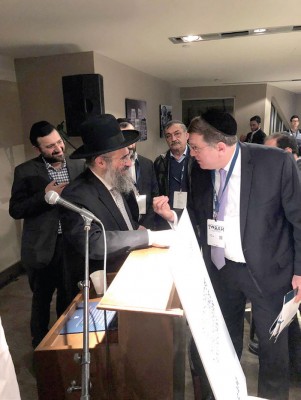
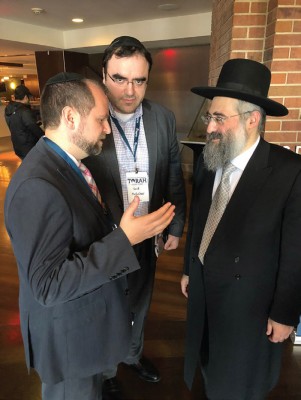
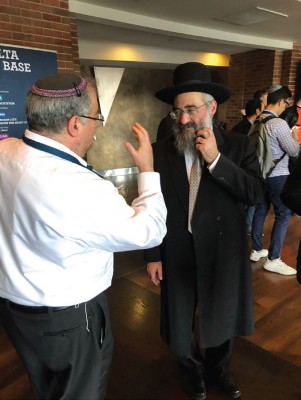
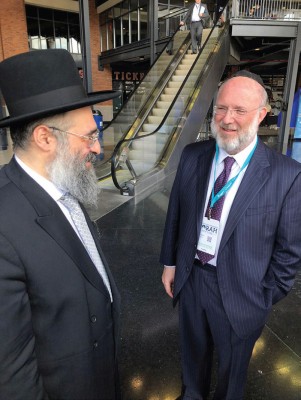
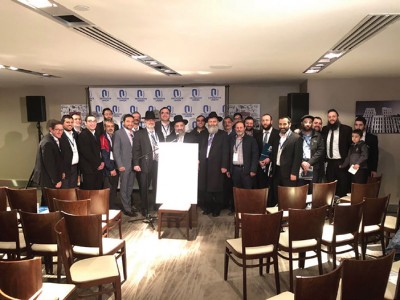
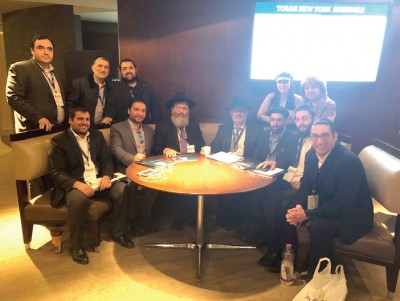
On Sunday, April 29, Chief Rabbi of the Bukharian community Harav Yitzchak Yisraeli spoke by request at the annual OU “Torah New York” event at Citi Field. Over 2,000 people attended the spectacular event; one could see Jews from all walks of life making their way around the Citi Field complex, all of them coming to hear inspirational words of Torah by veteran speakers. The event presented speaker after speaker, from 8:45 a.m. until 6:00 p.m., offering every guest a wide range of subjects to choose from. Topics included speeches on ahavas Hashem, emunah, freedom, Pesach Sheni, and technology in halachah, among others. Harav Yisraeli presented a very well-received speech on what sets the Jewish nation apart, which I will summarize here.
Moshe Rabbenu goes down in history as the great defender of Israel. Our Torah records how he beseeched Hashem on behalf of his people against impossible odds and even faced utter destruction fighting for their existence. However, Moshe Rabbenu was also our greatest teacher and advocate. Our sages tell us that when Moshe ascended on high to receive the Torah, the angels attempted frustrate his mission. They contended: “Why should Hashem’s lofty Torah be given to flesh and blood, when its proper place is in Heaven?”
The angels were arguing within a particular context. There is a legal principal in the Torah that when a person decides to sell his field, he must first offer it to a neighbor with an abutting field. In essence, the exalted angels were claiming that as “neighbors” of the supernal Torah, they should receive the Torah and not the Jews. They similarly exclaimed, “What is this mortal doing amongst us in Heaven?” Moshe is moving from the physical plain into the spiritual realm in order to “steal” the divine Torah!
However, Moshe came prepared. There is a second legal principal in the above-mentioned context, as mentioned by the Shach and the Rif. When a man sells his field, he must first consider any neighbor with an abutting field, unless the seller also has a son. According to the Torah, the seller’s son takes precedence over any neighbor in the sale of any real estate.
Moshe argued that, as children of the Almighty, the Jews indeed are entitled to the Torah, even before considering the angels. Throughout Tanakh, Hashem relates to the Jewish nation as his children. In a similar vein, Rabbi Akiva teaches in Avot, “Beloved are the Jews, who are children of Hashem… who were given the [Torah].”
What is especially impressive about this exchange between Moshe and the angels is the fact that the Jewish nation’s acquisition of the Torah was dependent on a financial law.
The Rambam writes in Hilchot Deot, Perek Vav, that a person needs to care for his friend’s finances as he would care for his own. Relating to this theme, the Talmud in tractate Chullin questions whether a person may sell nevelah (non-kosher meat) to a non-Jew, since the non-Jew may purchase it on the assumption that the meat is indeed kosher. Similarly, the Gemarah deliberates if a non-Jewish client must be notified when he is purchasing a shoe made from leather of a killed animal as opposed to a ritually slaughtered animal. In both of these cases, the quality of the product is the variable, and the Talmud wishes to inform us that we have a duty to disclose even the smallest financial differences.
In the Pesach Haggadah, we sing “Dayenu” to the fact that Hashem brought our nation to the foot of Har Sinai before giving us the Torah. But what is so sufficient about standing at the bottom of the mountain if we had not received the Torah? Chazal tell us that Hashem commanded Moshe to tell the Jews that they became a “kingdom of priests” and “children of Hashem” at the foot of the mountain, even before they received the Torah. This was to demonstrate the place of the Torah–only a nation that can fulfill such a role could receive the Torah. Only a nation that was willing to act as the “children of Hashem” could be worthy of the lofty Torah.
Immediately after recording the events of Matan Torah in Parshat Yitro, the Torah introduces us to the Law in Parshat Mishpatim. Tellingly, the laws in this parsha heavily emphasize our nation’s responsibility of ben adam lechavero, laws regarding our interaction with one another. These laws are all financial in nature, dealing with torts, theft, and similar topics. It is no coincidence that these topics follow Matan Torah, because, as the Rosh says, a proper tsadik who keeps all the Torah has a good relationship with Hashem and also with his fellow man. Our sages teach us that Hashem is concerned more with the deeds between man and man than between Him and man.
The Talmud in Bava Kama teaches that if a person wants to reach the level of a chassid (serving Hashem with special devotion), he should be careful in the laws of brachot. Another opinion says that one should be circumspect in his financial dealings. A final opinion suggests that such a person fulfill what is written in Pirkei Avot. The Maharsha explains that all three opinions together make a chassid. The Brachot are between Man and Hashem, while finance law and Pirkei Avot refine the character to perfect social interaction.
As a nation, we were given the Torah in order to ensure that we keep all of these laws in their proper detail. We are a unique nation, the “Children of Hashem,” because of our adherence to these laws. The Torah is what makes us a source of guidance for the nations of the world, and what will ultimately refine all of humanity to serve Hashem with a full heart. May we all merit to witness those days, Amen.
By Adam Suinov
Bukharian Chief Rabbi Harav Yitzchak Yisraeli Speaks At OU’s ‘Torah New York’ At Citi Field
Typography
- Smaller Small Medium Big Bigger
- Default Helvetica Segoe Georgia Times
- Reading Mode


